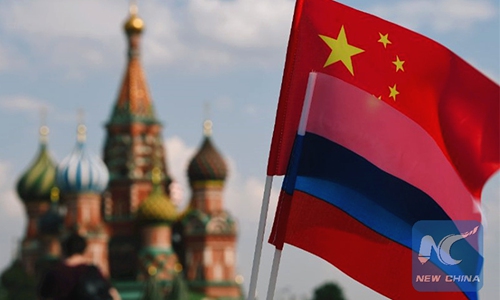HOME >> OPINION
China-Russia ties to deepen despite US wedge
By Yang Jin Source:Global Times Published: 2020/1/20 18:58:41

Photo: Xinhua
The National Interest on January 14 published an article - "As America Worries About China, Russia Eyes The South China Sea," saying "Russia's presence in the South China Sea complicates the ongoing disputes between China and its neighbors over competing territorial claims" in the context of Russian resource exploration with the Philippines and gas projects with Vietnam.Russia's cooperation with Vietnam and the Philippines can date back to the Soviet era, instead of moves directed at China. The article seemingly intends to sow discord between China and Russia, because the solid comprehensive strategic partnership of coordination for a new era is a bulwark against US antagonism for the two countries. Currently, US elites seek to undermine China-Russia ties.
As a result, Washington often releases some messages or articles to drive a wedge between the two countries, claiming Beijing and Moscow are competing and have strategic disputes in regions such as the South China Sea and Central Asia. We should view such rhetoric with a rational mind.
Take Vietnam as an example. Before the end of the Cold War, the Soviet Union supported Southeast Asian countries such as Vietnam and the Philippines to have an upper hand in its strategic confrontation with China. Their cooperation ranged from military to petroleum exploration.
But Moscow's present cooperation with Southeast Asian countries is mainly to meet its economic ends. Although strategic considerations behind Russia's presence in the region cannot be ruled out, it serves Russia's global strategy, instead of targeting China.
Russia's presence in the South China Sea will not aggravate territorial disputes between China and its neighbors, but the US presence has done that. The support the US has offered to Southeast Asian countries such as the Philippines and Vietnam has far exceeded Russian support to these states.
In addition to political rhetoric to bolster Southeast Asian countries, the US has directly meddled in the South China Sea issue by reinforcing its military presence, intensifying regional economic and political rivalry and territorial disputes. This has seriously complicated the issue pertaining to the contentious water body.
Washington has its own strategy in the region. In the pretext of protecting its allies and keeping its so-called freedom of navigation operation, the US main intention is to contain China, preventing this East Asian country from expanding its influence in the region. Washington hopes it can continue dominating the political and security order in Southeast Asia.
Russia's presence in the South China Sea is mainly to pursue its economic interests. Its influence there has been far less than that of the US. Though Russia has maintained military cooperation with regional powers, the purpose is not strategic. The external power which affects the South China Sea situation is the US, rather than Russia.
It cannot be denied that although bilateral ties have been updated, differences remain between China and Russia. Any two countries' national interests cannot completely coincide no matter how close they are. It is normal that Beijing and Moscow have differences over economy and divergences in interests, yet they are not a hurdle in the way of bilateral strategic cooperation.
Beijing and Moscow have diverse common interests and consensus on global politics. They enjoy close stances on international order, and some vital global issues.
The development stage and levels of the two countries' economic development are similar - neither of them is a developed country. They don't pursue global hegemony, nor have fundamental conflicts of interest, which forms the foundation for them to engage in strategic cooperation.
Even though Russian Prime Minister Dmitry Medvedev's government announced its resignation on January 15 as President Vladimir Putin proposed a nationwide vote on sweeping constitutional changes, it would not undermine China-Russia ties, which are determined by bilateral interests.
Moscow-Washington ties are not expected to significantly improve in 2020. In terms of some vital issues such as Ukraine, Syria, Iran and North Korea, the positions of the two great powers differ. Russia is also pursuing its national rejuvenation, while the US is reluctant to see Russia restore its global position to the Soviet era, and will spare no effort to contain Russia's advances.
In this context, there would be no significant changes in China-Russia ties, except that they will further deepen. The two countries will engage in broader cooperation under frameworks such as the China-proposed Belt and Road Initiative, the Shanghai Cooperation Organization, and the United Nations, and in domains including economy, regional order and global governance.
The author is deputy director at the Department of Central Asian Studies, the Institute of Russian, Eastern European and Central Asian Studies of the Chinese Academy of Social Sciences. opinion@globaltimes.com.cn
Posted in: ASIAN REVIEW